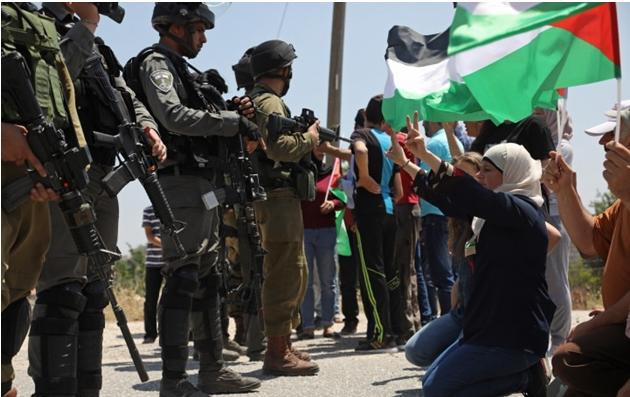The Knesset advanced legislation on Wednesday, June 14, that would put an end to the annual transfer of an estimated 1 billion shekels ($280 million) in taxes to the Palestinian Authority (PA) as a sanction against the latter’s compensation program that provides financial allowances to Palestinians imprisoned by Israel and their families.

Palestinian protesters sit in front of Israeli soldiers during a protest against the occupation and in solidarity with the Palestinian prisoner’s hunger strike, in the West Bank village of Nabi Saleh, May 12, 2017. Israeli soldiers shot and killed Palestinian youth, Saba Abu Ubeid, during the protest. (Photo: Activestills)
The Knesset plenum approved a preliminary reading of the bill by a vote of 48 to 13 amidst contradictory statements by Israeli, Palestinian, and US officials regarding the status of the payments.
The payments are part of a social program managed by the Palestine Liberation Organization (PLO) that provides financial allowances to Palestinians imprisoned in Israel and their families, those injured by Israeli forces, and families of Palestinian killed by Israeli forces, whether during attacks against Israelis or in situations in which they were void of wrongdoing.
Haaretz reported that US Secretary of State Rex Tillerson made a significant switch in the US position towards the issue, saying on Wednesday that the US was in the midst of an “active discussion” with the PA on the matter, while on Tuesday he had declared that the PA had completely changed its own policy.
In response to Tillerson’s comments, both Israeli and Palestinian officials denied that the PA has made any change to its policy, despite Tillerson’s having said on Wednesday that the assurances of Palestinian officials “were given to me during [President Trump’s] visit to Bethlehem” last month.
Haaretz quoted Issa Qaraqe, head of the Palestinian Committee of Prisoners’ Affairs, as saying that “no such decision could ever possibly be made, since it would spell the end of the PA with the Palestinian public.” Qaraqe told Haaretz that “almost every other household among the Palestinian people is the family of a prisoner or martyr… Anybody who thinks he can execute a decision like that is sadly mistaken.” Haaretz also quoted what they identified as a senior Israeli official saying [Israel is] not aware of any change in PA policy.
During Wednesday’s first reading of the legislation in the Knesset, Israel’s deputy defense minister, Eli Ben Dahan of the right-wing Jewish Home party, said “it is not acceptable that with one hand, they [the Palestinians] seek to make peace with Israel, while with the other they continue to fund terrorists.” Meanwhile, MK Youssef Jabareen (Hadash – Joint List) condemned the bill as draconian, saying “it is collective punishment against the entire Palestinian population. There are hardly any families that don’t have a relative that is a political [or] security prisoner,” said Jabareen. “This is a bill of an occupier punishing the nation it is occupying. The payments are intended for families to prevent them from starving.”
The social program, which began in 1966, has been the target of criticism in Israel for years. While the bulk of the PLO program was shifted in 1998 to the PA following the Oslo Peace Accords, in the wake of criticism by the US and the passing of American legislation aimed at cutting funds to the PA, in 2014 the distribution of payments was shifted entirely back to PLO management.
In March 2017, the Israeli rights group B’Tselem published a report detailing how, over the past 20 years, Israel has introduced legislation to avoid paying compensation to Palestinians who have been injured by Israeli forces. In particular, Israel has used the payments distributed by the PLO to wounded Palestinians and the families of Palestinians killed by Israeli forces to justify its own forgoing of paying direct compensation to Palestinians for such damages. In addition, Israel regularly withholds transferring of taxes to the PA to apply political pressure on the Authority, despite Israeli human rights groups having said that such punitive measures amounts to collective punishment.


